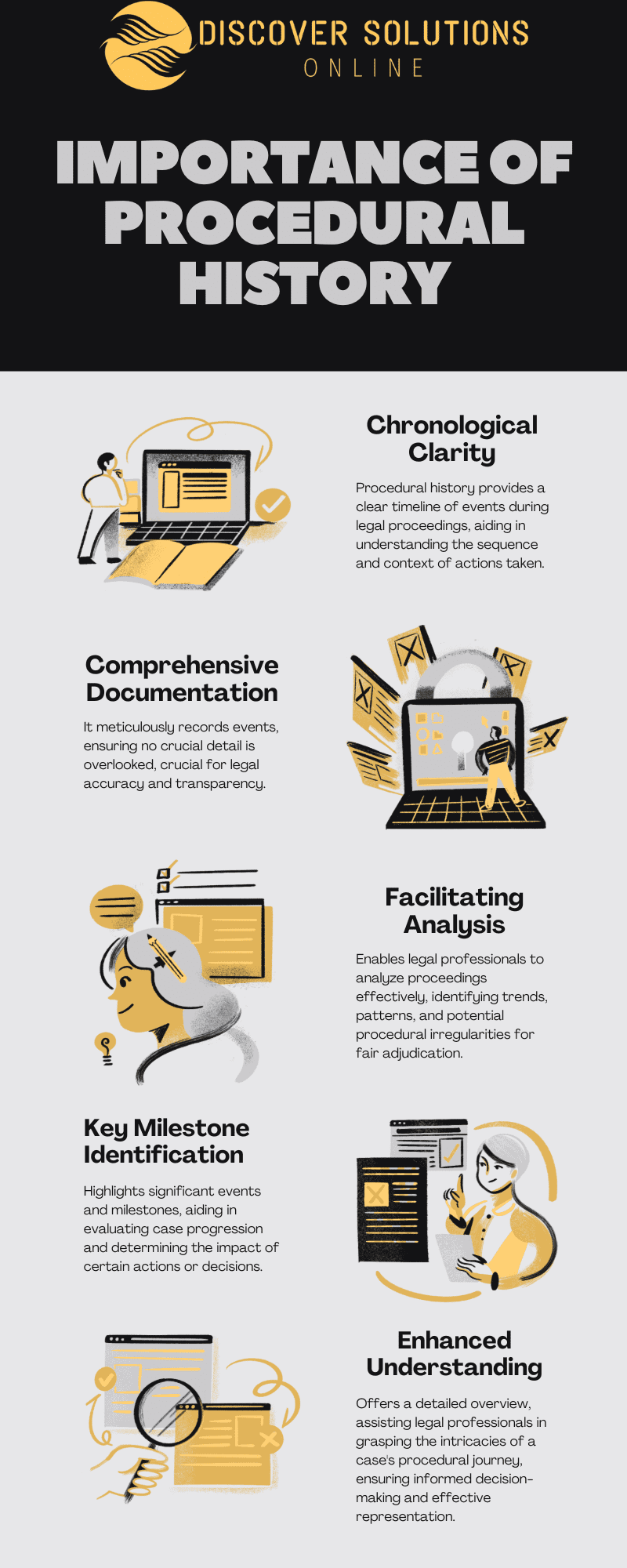Procedural history is an indispensable aspect of legal proceedings, often overlooked or underestimated in its importance. Yet, it serves as the backbone upon which the legal case is built, providing a detailed account of the events that transpired from the initiation of the lawsuit to its final resolution. Understanding the role of procedural history in legal cases is crucial for legal professionals, as it enables them to navigate through complex legal landscapes with clarity and precision.
At its core, procedural history refers to the meticulous documentation of events and actions that occur during legal hearings. This documentation includes everything from the filing of the initial complaint to the final judgment, capturing each procedural step along the way. These records are meticulously maintained, ensuring accuracy and completeness.
One of the primary functions of procedural history is to provide a clear and chronological overview of the proceedings. This allows legal professionals to track the progression of the case, identifying key milestones and pivotal moments. By understanding the sequence of events, lawyers can better anticipate future developments and strategize accordingly.
Moreover, procedural history serves as a vital tool for preserving the integrity of the legal process. It ensures transparency and accountability by documenting every action taken by the parties involved. This not only helps prevent misunderstandings and disputes but also serves as a safeguard against potential misconduct or procedural errors.
Unraveling the Layers of Procedural History
Legal proceedings are intricate processes that involve a series of steps and actions aimed at resolving disputes or enforcing rights. Within this legal framework, procedural history emerges as a critical component, often underappreciated yet fundamentally essential. It encompasses the meticulous documentation of events and actions that transpire during hearings, offering a comprehensive record of the case’s journey from initiation to resolution. In this extensive exploration, we delve into the multifaceted role of procedural history in legal proceedings, shedding light on its significance and implications.

The Fundamentals of Procedural History
Procedural history forms the foundation upon which legal cases unfold. At its core, it involves the systematic recording of events, motions, filings, and rulings that occur throughout the course of a legal proceeding. From the moment a complaint is filed to the issuance of a final judgment, every procedural step is meticulously documented, creating a chronological timeline of the case.
The primary purpose of procedural history is to provide a clear and accurate account of the proceedings. By maintaining detailed records, legal professionals can track the progression of the case, identify key milestones, and analyze the sequence of events leading up to a resolution. This chronological overview not only helps parties involved in the case understand its trajectory but also serves as a valuable reference for judges, attorneys, and other stakeholders.
The Role of Procedural History in Providing Clarity
Clarity is paramount in the legal realm, where precision and accuracy are essential for ensuring fair and just outcomes. Procedural history plays a crucial role in providing this clarity by offering a comprehensive record of the proceedings. By documenting each step taken during a legal case, procedural history enables parties to understand the context in which decisions were made and actions were taken.
Moreover, procedural history serves as a tool for identifying patterns and trends within the legal system. By analyzing past cases and their procedural histories, legal professionals can gain insights into common practices, prevailing attitudes, and potential biases. This information can be invaluable in shaping future strategies and advocating for systemic reforms aimed at promoting fairness and equity.
Ensuring Transparency and Accountability
Transparency and accountability are foundational principles of the legal system, essential for maintaining public trust and confidence. Procedural history plays a vital role in upholding these principles by documenting every action taken by the parties involved in a case. From filings and motions to court orders and rulings, every aspect of the proceedings is meticulously recorded, ensuring transparency and accountability throughout the process.
Moreover, procedural history serves as a safeguard against potential misconduct or procedural errors. By providing a detailed account of the proceedings, it allows parties to identify and address any irregularities or improprieties that may arise. This transparency not only helps prevent misunderstandings and disputes but also fosters trust and confidence in the integrity of the legal system.
Shaping the Outcome of Legal Proceedings
The documentation of procedural history has a profound impact on the outcome of legal proceedings. Judges and decision-makers often rely on the procedural history of a case to make informed decisions and rulings. By reviewing the sequence of events and the actions of the parties involved, they can assess the credibility of the arguments presented and determine the appropriate course of action.
Moreover, procedural history can influence the way in which legal arguments are framed and presented. By referencing past rulings and procedural decisions, attorneys can tailor their strategies to align with prevailing legal standards and expectations. This strategic use of procedural history can enhance the persuasiveness of legal arguments and increase the likelihood of a favorable outcome for their clients.
Implications for Appeals and Future Litigation
Procedural history has significant implications for appeals and future litigation. Appellate courts frequently review the procedural history of a case to evaluate whether the trial court made any errors or missteps that warrant reversal. By examining the record of the proceedings, appellate judges can identify any procedural irregularities or legal errors that may have occurred and take appropriate action to rectify them.
Moreover, procedural history can shape the way in which future litigation unfolds. By studying past cases and their procedural histories, attorneys can gain valuable insights into effective litigation strategies and tactics. This information can inform their approach to future cases, helping them anticipate potential challenges and navigate complex legal issues more effectively.
Navigating Complex Legal Landscapes
In today’s complex legal landscape, navigating the intricacies of the legal system can be a daunting task. Procedural history serves as a roadmap for navigating through these complexities, providing clarity and direction amidst uncertainty. By documenting the sequence of events and actions that occur during a case, procedural history helps parties understand the context in which decisions are made and anticipate future developments.
Moreover, procedural history can be particularly valuable in complex cases involving multiple parties and intricate legal issues. By providing a comprehensive record of the proceedings, it allows parties to track the progress of the case and identify potential areas of contention or dispute. This information can be instrumental in developing effective litigation strategies and advocating for the interests of their clients.
Maximizing Legal Efficiency: The Power of Procedural History
Procedural history services are indispensable in legal proceedings, offering a host of advantages to legal professionals and their clients. These services involve meticulously documenting events and actions throughout a case, creating a clear and chronological record of the proceedings. Let’s delve into the benefits of maintaining accurate procedural history records:
Clarity and Understanding
Procedural history records provide clarity by outlining the sequence of events during legal proceedings. This chronological overview helps legal professionals and stakeholders understand the case’s progression, minimizing confusion and ensuring everyone is on the same page. When legal matters become convoluted, as they often do, having a procedural history to refer to can illuminate the path forward. By detailing every action taken and event that occurred, these records serve as a roadmap for navigating the complexities of the case.
In addition to aiding in comprehension, procedural history records also facilitate transparency. Parties involved in the legal process, including clients, attorneys, and judges, can refer to these records to gain insight into how the case has unfolded over time. This transparency fosters trust and confidence in the legal system, as stakeholders can see that proceedings are conducted in a fair and orderly manner.
Evidence Preservation
Accurate procedural history records serve as a form of evidence preservation. By documenting events as they unfold, these records create a detailed account of the case’s history, which can be crucial in supporting legal arguments and presenting evidence in court. In litigation, the ability to substantiate claims with concrete evidence can make or break a case. Procedural history records provide a reliable foundation upon which legal arguments can be built, offering a comprehensive record of the facts and circumstances surrounding the case.
Moreover, procedural history records help safeguard against the loss or alteration of critical evidence. By documenting events in real-time, these records create a contemporaneous record that cannot be easily tampered with or disputed. This preservation of evidence ensures the integrity of the legal process and enhances the likelihood of achieving a just outcome.
Efficiency and Time-Saving
With procedural history records readily available, legal professionals save time that would otherwise be spent piecing together the case’s timeline. This efficiency allows them to focus on building strong arguments and advocating for their clients effectively. In the fast-paced world of litigation, time is of the essence. Legal professionals must be able to access information quickly and efficiently to meet deadlines and respond to developments in a timely manner.
Procedural history records streamline the process of gathering information, eliminating the need to sift through voluminous files or rely on memory alone. Instead, legal professionals can access a comprehensive record of the case’s history with just a few clicks, allowing them to devote more time and energy to the substantive aspects of their work. This time-saving benefit not only enhances productivity but also improves the overall quality of legal representation.
Facilitates Case Management
Maintaining accurate procedural history records aids in effective case management. Legal professionals can track deadlines, monitor key developments, and ensure all necessary steps are taken to move the case forward, thanks to these organized records. In complex legal matters involving multiple parties and numerous procedural requirements, effective case management is essential to success.
Procedural history records serve as a valuable tool for keeping cases on track and ensuring that nothing falls through the cracks. By documenting every action taken and decision made throughout the course of the proceedings, these records provide a roadmap for advancing the case toward resolution. Whether preparing for trial, negotiating settlements, or filing motions, legal professionals can rely on procedural history records to guide their actions and ensure that no important details are overlooked.
Enhances Communication and Collaboration
Procedural history records facilitate effective communication and collaboration among legal professionals, clients, and other involved parties. By providing a comprehensive overview of the case’s history, these records ensure everyone is informed and aligned. Effective communication is essential in the practice of law, where success often depends on the ability to convey complex information clearly and concisely.
Procedural history records serve as a common reference point for all parties involved in the case, enabling them to communicate more effectively and work together toward common goals. Attorneys can use these records to update clients on the status of their cases, answer questions, and address concerns. Similarly, clients can review procedural history records to stay informed about the progress of their cases and understand the rationale behind their attorney’s strategy.
Supports Appellate Review
Appellate courts rely on procedural history records to understand lower court proceedings when cases are appealed. These records provide crucial information for appellate courts to review decisions and make informed rulings. The appellate process involves a thorough examination of the lower court’s proceedings, including the evidence presented, arguments made, and rulings issued.
Procedural history records serve as a roadmap for appellate courts, guiding them through the complexities of the case and helping them understand the context in which key decisions were made. By providing a comprehensive record of the proceedings, these records enable appellate courts to conduct a thorough review and render a fair and just decision. Without accurate procedural history records, appellate review would be significantly more challenging, if not impossible.
Ensures Compliance and Accountability
Accurate procedural history records help ensure compliance with procedural rules and regulations. They serve as a tool for accountability, allowing parties to track adherence to procedural requirements and address any deviations that may arise. In the legal profession, adherence to procedural rules is paramount to maintaining the integrity of the judicial system and ensuring fair and impartial proceedings.
Procedural history records provide a means of verifying that all parties have complied with the rules governing the conduct of the case. By documenting every action taken and decision made, these records create a record of accountability that can be referenced if questions or disputes arise. This accountability fosters trust and confidence in the legal process, reassuring stakeholders that proceedings are conducted in a transparent and equitable manner.
The Impact of Procedural History on Case Outcomes
Procedural history plays a pivotal role in shaping the outcomes of legal cases. It serves as a roadmap that guides legal professionals through the intricate terrain of litigation, providing invaluable insights into the sequence of events and decisions that have transpired during the course of a legal proceeding. Understanding the impact of procedural history on case outcomes is crucial for lawyers, judges, and other stakeholders involved in the legal process. In this section, we will delve into the various ways in which procedural history influences the resolution of legal disputes.
Preserving Legal Integrity
One of the fundamental functions of procedural history is to preserve the integrity of the legal process. By meticulously documenting the events and actions that occur during legal proceedings, procedural history ensures transparency and accountability in the administration of justice. Legal professionals rely on procedural history to uphold the principles of due process and fair treatment, thereby safeguarding the rights of litigants and maintaining public trust in the legal system.
Establishing a Framework for Analysis
Procedural history provides a framework for analyzing the progression of a case from its inception to its resolution. By documenting key events such as filings, motions, hearings, and rulings, procedural history enables legal professionals to trace the evolution of legal arguments, identify strategic decisions made by parties, and assess the reasoning behind judicial determinations. This historical perspective is essential for conducting thorough legal research, preparing persuasive arguments, and anticipating potential outcomes in future proceedings.
Identifying Patterns and Trends
Another important aspect of procedural history is its role in identifying patterns and trends that may influence case outcomes. By analyzing past rulings, procedural rulings, and procedural motions in similar cases, legal professionals can discern recurring themes, procedural pitfalls, and successful strategies employed by litigants. This empirical data allows lawyers to make informed decisions about case strategy, procedural tactics, and settlement negotiations, thereby maximizing their chances of achieving a favorable outcome for their clients.
Managing Legal Risk
Procedural history serves as a tool for managing legal risk by highlighting potential vulnerabilities and pitfalls in a case. By reviewing the procedural history of similar cases, legal professionals can anticipate procedural challenges, jurisdictional issues, and evidentiary disputes that may arise during litigation. This proactive approach enables lawyers to develop contingency plans, mitigate potential risks, and avoid costly mistakes that could jeopardize the outcome of a case. Moreover, by leveraging the insights gleaned from procedural history, lawyers can effectively navigate procedural hurdles, expedite the resolution of disputes, and minimize the time and resources expended on litigation.
Enhancing Judicial Decision-Making
Procedural history also plays a crucial role in enhancing judicial decision-making by providing judges with a comprehensive record of the proceedings. Judges rely on procedural history to assess the procedural posture of a case, evaluate the legal arguments presented by parties, and determine the appropriate course of action. By referencing procedural history, judges can ensure consistency and coherence in their rulings, promote adherence to established legal standards, and uphold the principles of judicial independence and impartiality.
Facilitating Case Management
Effective case management is essential for ensuring the efficient and timely resolution of legal disputes. Procedural history facilitates case management by enabling judges to track the progress of a case, monitor compliance with procedural rules, and allocate resources judiciously. By maintaining an accurate record of case-related events and deadlines, procedural history helps streamline court proceedings, reduce administrative burdens, and promote the expeditious resolution of disputes. Additionally, procedural history enables parties to track the status of their cases, monitor developments, and stay informed about upcoming deadlines and court appearances.
Procedural History: Safeguarding Due Process Rights
In the intricate world of legal proceedings, where every decision holds immense weight, procedural history stands as a beacon of clarity and accountability. It serves as the meticulous chronicler, recording every motion, hearing, and decision with precision. Yet, its significance often goes unrecognized, overshadowed by the complexities of legal strategy and argumentation. However, a closer examination reveals that procedural history is not merely a bureaucratic formality but a cornerstone of justice, safeguarding due process rights and ensuring the fair administration of the law.
Understanding Procedural History
Before delving into its importance, it’s crucial to understand what exactly procedural history entails. Procedural history encompasses the detailed documentation of events and actions that unfold during legal proceedings. It includes everything from the filing of motions to the presentation of evidence, providing a chronological account of the case’s progression. This comprehensive record serves as a roadmap for legal professionals, offering clarity and insight into the sequence of events and key milestones during a hearing.
The Role of Procedural History Services
Procedural history services play a vital role in the legal process by ensuring that every aspect of a case is meticulously documented. These services involve the collection, organization, and preservation of documents, transcripts, and other relevant materials related to the proceedings. By maintaining a comprehensive record of the case’s history, procedural history services provide transparency, accountability, and protection against procedural errors.
The Importance of Chronological Documentation
One of the key functions of procedural history is to provide a chronological overview of the case’s progression. This chronological documentation is essential for understanding the sequence of events and how they have unfolded over time. By organizing information in a clear and systematic manner, procedural history enables legal professionals to track the development of the case and identify any patterns or trends that may emerge.
Safeguarding Due Process Rights
Due process is a fundamental principle of justice that ensures fairness and impartiality in legal proceedings. Procedural history plays a critical role in safeguarding due process rights by providing transparency, accountability, and protection against procedural errors.
Protection Against Procedural Errors
Procedural errors can have serious consequences on the outcome of a case, potentially depriving parties of their due process rights. Procedural history serves as a safeguard against such errors by providing a detailed record of the proceedings. Legal professionals can use this documentation to identify and rectify any procedural missteps that may have occurred, ensuring that due process rights are upheld at every stage of the legal process.
Enhancing Legal Strategy
Understanding the procedural history of a case is essential for developing an effective legal strategy. By analyzing past motions, rulings, and decisions, legal professionals can identify patterns and trends that may impact their approach to the case.
Anticipating Challenges and Opportunities
Procedural history provides valuable insights that can help legal professionals anticipate potential challenges and identify opportunities for leverage. By examining past rulings and decisions, attorneys can gain a better understanding of how the court is likely to rule on certain issues. This allows them to tailor their strategy accordingly, maximizing their chances of success.
Leveraging Precedent and Precedent
Precedent plays a crucial role in the legal system, shaping the way courts interpret and apply the law. Procedural history allows legal professionals to identify relevant precedent and leverage it to their advantage. By examining past cases with similar facts or legal issues, attorneys can develop persuasive arguments that are grounded in established legal principles.
Providing a Comprehensive Record
Appellate courts rely on procedural history to gain insight into the proceedings leading up to the appeal. This comprehensive record allows them to assess whether due process rights were upheld throughout the legal process and whether any errors occurred that may have affected the outcome of the case.
Ensuring Fair and Impartial Review
By providing a detailed account of the proceedings, procedural history ensures that appellate courts can conduct a fair and impartial review of the case. This allows them to make informed decisions based on the facts and legal arguments presented, without bias or prejudice.
In conclusion, procedural history stands as a fundamental pillar of the legal system, safeguarding due process rights, promoting transparency, and enhancing the administration of justice. Its role in preserving fairness, accountability, and efficiency within legal proceedings cannot be overstated. By documenting the sequence of events and pivotal decisions, procedural history ensures that parties receive fair treatment and protection of their legal rights. Moreover, it facilitates legal strategy, appellate review, and overall legal integrity. Recognizing and valuing the importance of procedural history is crucial for legal professionals in advocating for their clients and upholding the principles of justice. Thus, investing in comprehensive procedural history services is essential for navigating the complexities of litigation and achieving successful outcomes in legal proceedings.
How Discover Solutions Online Elevates Your Procedural History
Discover Solutions Online specializes in providing comprehensive procedural history services to legal professionals, ensuring that every aspect of legal proceedings is meticulously documented and organized. Our team is dedicated to helping clients navigate the complexities of litigation by creating accurate and detailed records of case timelines, key decisions, and procedural steps.
Comprehensive Documentation
Discover Solutions Online specializes in meticulously documenting every aspect of legal proceedings, including case timelines, key decisions, and procedural steps.
Navigating Complexity
Our dedicated team helps legal professionals navigate the complexities of litigation by creating accurate and detailed records, facilitating a clear understanding of case progression.
Preserving Transparency and Fairness
Through our services, we assist in preserving transparency, fairness, and accountability within the legal system. By documenting the sequence of events and pivotal decisions, we ensure that parties receive fair treatment and protection of their legal rights.
Promoting Efficiency and Effectiveness
We emphasize adopting best practices for documenting procedural history, promoting efficiency, effectiveness, and integrity within the legal process. Our focus on maintaining an accurate and comprehensive record enables legal professionals to advocate zealously for their clients.
Empowering Legal Success
Discover Solutions Online recognizes the indispensable role of procedural history in preserving due process rights and enhancing case outcomes. Leveraging our expertise and insights effectively, we empower legal professionals to navigate litigation successfully and achieve favorable results for their clients.





